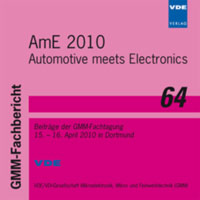Distributed Component Systems Modelling with Parallel Composition
Conference: AmE 2010 - Automotive meets Electronics - GMM-Fachtagung
04/15/2010 - 04/16/2010 at Dortmund, Germany
Proceedings: AmE 2010 - Automotive meets Electronics
Pages: 6Language: englishTyp: PDF
Personal VDE Members are entitled to a 10% discount on this title
Authors:
Uygur, Gürkan; Sattler, Sebastian (Lehrstuhl für Zuverlässige Schaltungen und Systeme, Universität Erlangen-Nürnberg, Paul-Gordan-Str. 5, 91052 Erlangen, Deutschland)
Abstract:
Automotive systems are rising up to huge and complex super-systems (hybrids) distributed all around the automotive vehicle exhibiting multi-mode and multi-processor operations, synchronously and asynchronously. They inherently produce almost all problems and challenges on Process and Control (PC) given in a complex network on chips as well as in complex components composed from sub-systems. Protecting consistency in their private operations as well as to each other is crucial for safety and security reasons. Therefore it is a very tough requirement to meet the mission profiles of all (sub-)systems composed. It also has an effect on the whole sub-system specific asynchronism of those systems. It implicitly sets the course for determining the range of tolerance, dependency and other interrelations by operating the super-system with respect to the capabilities of the composed sub-systems. For such hybrid systems (hybrids) a new modelling approach is suggested which is able to determine the best operating sequence at a given tolerance and schedule. It allows the monitoring of available resources and controlling the tasks by administrating a cost function of the total system. We recommend people to handle complex Process and Control (PC) tasks on using only one single composite model. Here we try to split all stakeholders of the super-system at system level into two disjunctive sets of "Requirements (R)" and "Capabilities (C)", the entities of all tasks around. Therefore, the C-set contains all resources depending on each other as well as on tasks or task-schedules, and the R-set contains all targets set by tasks depending on scheduled events. Abstracting PC by using this proposed formalism we are able to specify individual behaviour using discrete event system modelling techniques. The generated composition of the super-system then is capable to preserve consistency, task identity and interrelationship between all individuals. It doesn't depend on the order of sub-systems composed and their individual complexity, and finally results in a fully scalable and composite model.


